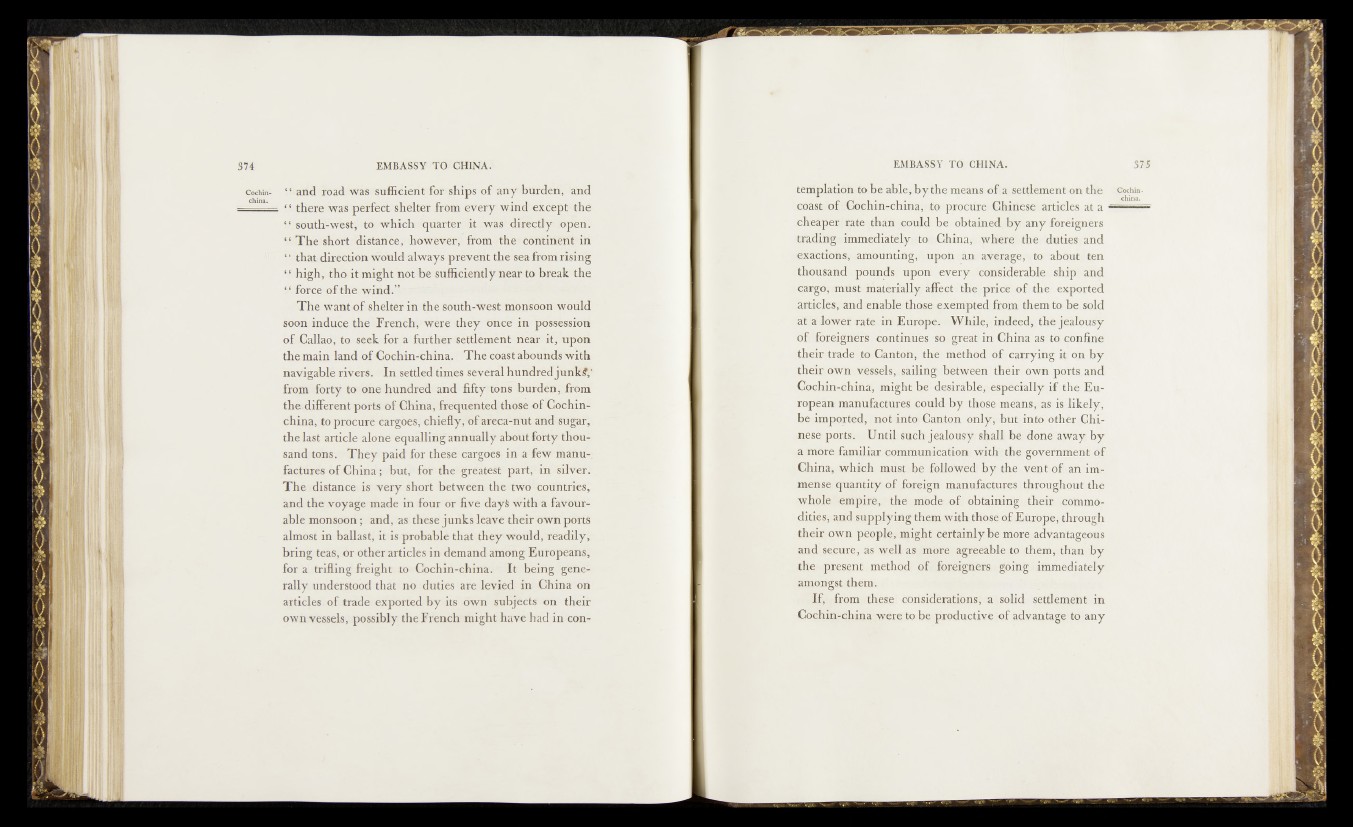
Cochin*- I ‘ and road was* sufficient for ships of axff&bürden, and
, “ thóriiYras perfect-shelter fromffe^r^v^Éd^'êxcfept thé
‘.‘ south-west, to which quarter it .was direbtly OpM&
“ The short distance; however*,' from the continent in
‘ ‘ that direction would always prevent the sea from rismgi
‘:‘ihigh>tho it might not be sufficiently near to break the
(g force of the wind.” ~~
The want of shelter in the south-west monsoon-Would
soon induce.the French, were they once in possession-
of Callao, to seek.for a further settlement necÉr- it, iTjJori
the main land of Cochin-china. The coast abounds with
navigable rivers. In settled times seyeral hundred junk?,*
from forty to ohe hundred and fifty tons burdq^p from
the, different ports of China, frequented thftsó of iGechin-
china, toproeurè-cargbes, chiefly ,ofareca-ÏMt aüdssjïgar,
the last article alone equalling'annually'ibout forty thousand
tons. They paid for these-cargoes in a*-réW«mSfiu-'
faclurés óf China? but* for the greatest partFfe^vfer*.
The distance is very short between the two countries;
and the voyage made in four or fivedayS with a favourable
monsoon; and, .as: these junks leave their own ports
almost in ballast, it is probable that they-would, readily,-
bring teas, or other articles in demand among «MnèOpialiSj
for a trifling freight1 to Cochin-china. It being generally
understood that no duties are levied in- China 'oft
articles of trade exported by its own subjects on their
own vessels, possibly the French night have had in contemptation,
t© be ablejbylhe means- oh a, settlement on thb > Cochin-
W^^Gpdun-chma, |wqpioctire* Chinese article^ at a
cheap en rate than,;o©ulcfe be^bbjainedpby an7 foreigners
trading,-immediately Chi-naywhere the duties and
’4xafctiohs}^ja|^pntihginwpoft aft; average,-7t<$' about ten
thousand pétóid^* uponl’ e^ety considerable ship pftd
■Qargov'mùsfe: materially; àfifeetr/the price'.op; the exported
artitqjesyand enable- feho.seaessenfpted from them to be sold
at a lower rate, in Europè|$ While, indeed, the jealous^ ,
of 1 forei^^^cJ^finri^S so-rgreap int China as’tôi-eonfine
th&irït'Eade'ftóï’G^nh^i^'th’e-.mêthod dfec^Ptying it on tóf.
théirrPMT^yies^efe^sailing;ibètween; thêir own ports^arid
CseMn-china, might, b.epl^sjhfable,' especially t if : the European.
manufactures cauld by thèse means, as is likely,
litt imported. notdntotCbnton only.dbuftdnfi© othferc-Ghi-
dapse.ports. ^Untiksuch jealousy, shall hól .done away by
jc^ïölpe. familiar communication^ with’ the government off
China, whióh- must;be follo'wed: byHtjhe venffi|$in immense
quantityof foreign manufactures throughout the
whole -empire, the mode o&i obtaining ; their commodities,
and supplyirig them with those;ojkEûrope, through'
theirr qWn people, might Certainly be more, advantageous
and securp,., as well* as more agreeable to them, than by
the present method of foreigners going ? immediately
amongst them.
If, from these- considérations, a solid settlement in
Cochin-china were to be productive of advantage to any